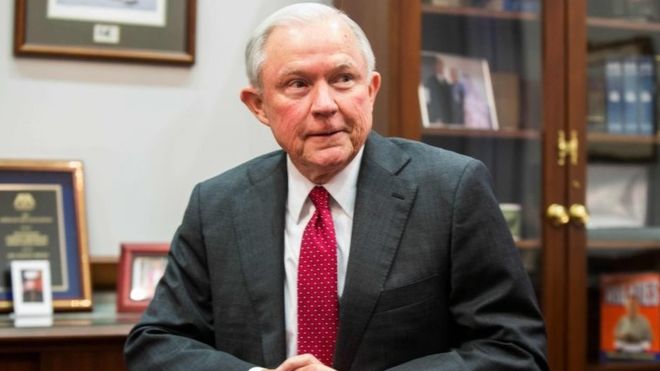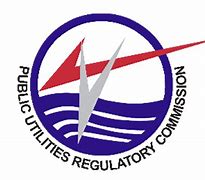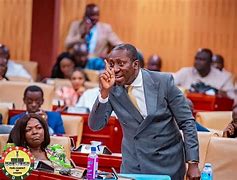
Attorney General Jeff Sessions met Russia’s ambassador twice during Donald Trump’s presidential campaign last year, the US government has confirmed.
Mr Sessions, a senator at the time, did not disclose the contacts at his January confirmation hearing.
But he stressed on Wednesday he had “never met any Russian officials to discuss issues of the campaign”.
Democratic House Minority Leader Nancy Pelosi accused Mr Sessions of “lying under oath” and demanded he resign.
Other Democrats called on him to step aside from an investigation by the FBI – which he oversees as attorney general – into the alleged Russian interference.
The news broke just after a congressional committee agreed an investigation into Russia’s alleged interference in the election.
The House intelligence panel inquiry will scrutinise contacts between Donald Trump’s presidential campaign and Moscow, members confirmed.
The White House denies any improper behaviour during the election campaign and did not comment immediately on the latest development.
Russia has consistently rejected allegations of interference
‘Absolutely nothing misleading’
The justice department confirmed that Mr Sessions had met Russian Ambassador Sergei Kislyak as a member of the Senate Armed Services Committee.
There was an office visit during the autumn and a meeting along with other ambassadors in the summer.
He had meetings with more than 25 foreign ambassadors in the course of the year.
During his confirmation hearing, Mr Sessions was asked what he would do if there was evidence that anyone from the Trump campaign had been in touch with Russia.
Mr Sessions replied that he was “unaware of those activities”.
In a statement on Wednesday night, Mr Sessions said: “I never met with any Russian officials to discuss issues of the campaign. I have no idea what this allegation is about. It is false.”
Justice department spokeswoman Sarah Isgur Flores said there had been “absolutely nothing misleading about his answer”.
“He was asked during the hearing about communications between Russia and the Trump campaign – not about meetings he took as a senator and a member of the Armed Services Committee,” she said.
Nikolai Lakhonin, press secretary of the Russian embassy in Washington, said the diplomatic mission did “not comment on numerous contacts” between Russian diplomats and “local partners”, Russia’s Interfax news agency reports.
Meanwhile, Congressman Adam Schiff, the top Democrat on the House intelligence committee, said that if the reports were accurate Mr Sessions must withdraw from the FBI investigation.
Mr Trump’s National Security Adviser, Michael Flynn, was fired last month after he misled the White House about his conversations with the Russian ambassador, allegedly regarding sanctions against Moscow.
House inquiry goes forward
Earlier on Wednesday, the House intelligence panel said in a statement that its Republican chairman, Devin Nunes, and Congressman Schiff had agreed to an investigation into Russia’s alleged election interference.
It said it would seek answers to the following questions:
- “What Russian cyber activity and other active measures were directed against the United States and its allies?”
- “Did the Russian active measures include links between Russia and individuals associated with political campaigns or any other U.S. Persons?”
- “What was the U.S. Government’s response to these Russian active measures and what do we need to do to protect ourselves and our allies in the future?”
- “What possible leaks of classified information took place related to the Intelligence Community Assessment of these matters?”
Until now, Republican senators had been reluctant to agree to Democratic Party demands for the inquiry.
How much did they know? Analysis by Tulip Mazumdar, BBC News, Washington
The Russia question is refusing to go away for President Trump.
This House intelligence committee, which has been investigating Russia for many years, says it will expand its inquiries to include Russian activities during the election and “leave no stone unturned”.
The FBI and the Senate intelligence committee are already investigating Russian interference during the election.
It has already been established by the CIA and others that Mr Putin’s government did make a concerted effort to help elect Donald Trump and to discredit his opponent Hillary Clinton.
But a key question remains – how much did the Trump campaign know about this?
President Trump has been dogged by questions about his advisers’ ties to Moscow since the campaign. The White House has strongly denied the claims.
The Associated Press news agency reports that White House lawyers instructed Mr Trump’s staff on Tuesday to preserve materials that could be connected to Russian interference in November’s election.
The US intelligence community concluded that alleged Russian hacking of Democratic organisations was ce:arried out to help Mr Trump defeat Democrat Hillary Clinton.
Source: BBC




